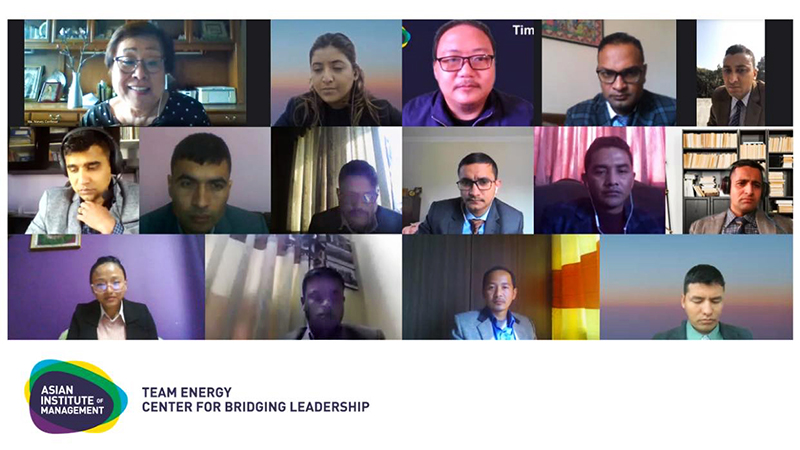
“Security is not just a matter of arms, but a matter of community as well,” shared Prof. Nieves Confesor, Retired Associate Professor and Former Dean of the Asian Institute of Management (AIM), as she addressed a class composed of Nepali army officers and inter-security agents from the United Kingdom (UK), United States of America (USA), Pakistan, Bangladesh, Sri Lanka, and Nigeria.
The AIM TeaM Energy Center for Bridging Leadership (AIMTEC-BL) was invited by the Nepal Administrative Staff College (NASC) to deliver two Bridging Leadership sessions as part of the Leadership and Management Training Program for the Army Command and Staff College (ACSC) last January 21 and 22, 2021. The online session was designed to orient sixty-nine (69) Nepali army officers and inter-security agents about the Bridging Leadership Framework and how it can be applied to deal with organizational and societal issues that confront the military and security sector in general.
AIMTEC-BL Executive Director Prof. Manuel De Vera began the discussion by citing the societal divides further amplified by today’s global health crisis and highlighting the crucial role of leadership in addressing the complexities of our current environments. “The question of leadership has been the most pervasive with the pandemic that has disrupted our day-to-day lives. This question has never been rhetorical now as we have observed from day-to-day how leaders respond to the crisis – with varying outcomes, and with poor communication strategies and decision-making processes, can often times end with disastrous consequences,” Prof. De Vera said.
Prof. Confesor then proceeded to discuss Volatility, Uncertainty, Complexity, and Ambiguity (VUCA) in the 21st century and noted that the degree of familiarity and certainty varies across different challenges faced by a military organization. Given this, she emphasized the importance of leaders taking a “whole systems approach” and conducting multi-stakeholder consultations to respond to chaotic situations to solve emerging problems. She explained that the Bridging Leadership Framework is an effective social technology to undertake such process as it guides leaders to acquire a broader and deeper sense of the perspectives of various stakeholders.

To contextualize the Bridging Leadership Framework, Prof. Confesor shared the work of AIM TEC-BL’s Fellows in the conflict-affected Mindanao region through the Mindanao Bridging Leadership Program (MBLP) -- a Fellowship funded by the World Bank from 2011 to 2013. The Fellowship involved key military actors along with governors, mayors, NGO and CSO leaders, university leaders, and businessmen in the region, focusing on co-creating social innovations to build the foundations for peace and address Mindanao’s more than four decades of violent conflict. One example was Lt. Col. Franco Raphael Alano’s project titled “Peace: From Arms to Farms,” which demobilized armed combatants in Lantawan, Basilan through the provision of livelihood opportunities using organic agriculture. Another example was the “Kape Mindanaw” enterprise project of Susano Balais, which encouraged collaboration between Muslim and Christian coffee farmers.
“These are situations where shared meaning-making is important. Here is where your leadership competencies come in. How do you bring people together so that you can create shared meaning among different stakeholders?”, Dr. Timothy Ting, Adjunct Faculty at AIM, posed as a challenge to the participants in addressing the emerging role of the military and the security sector within the communities they serve.